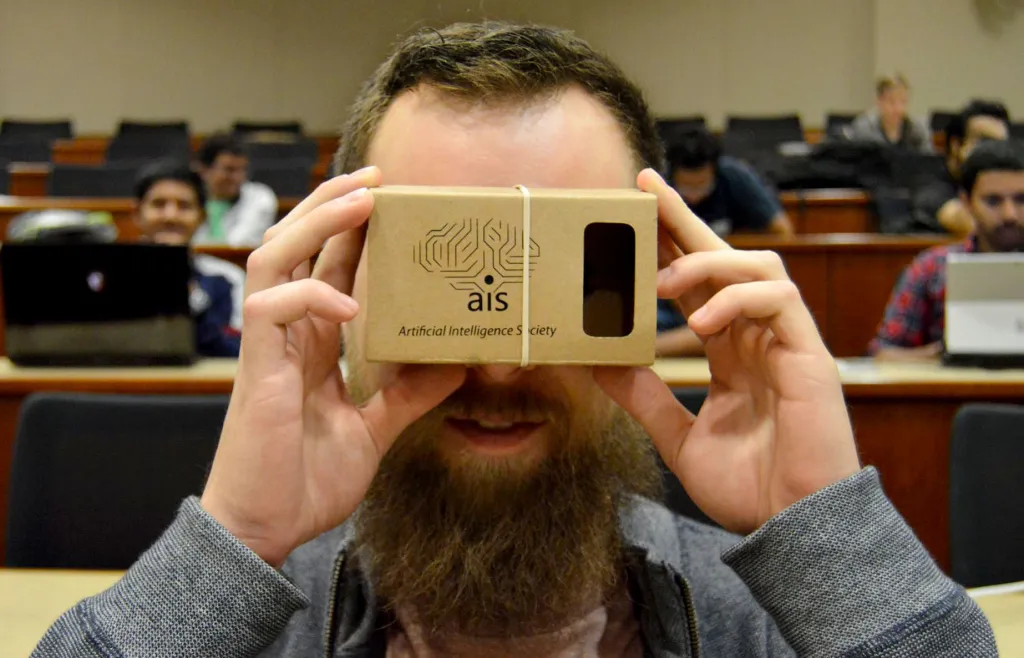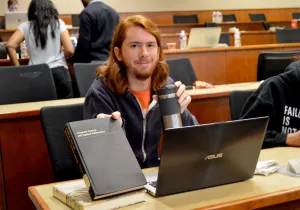UT Dallas AI Society Hosts Its First Annual 24-Hour HackAI Hackathon

Last fall, the UT Dallas Artificial Intelligence Society (AIS) hosted its first Annual 24-Hour HackAI Hackathon. The inaugural HackAI brought in 160 RSVP’s with approximately 90 students attending the event. The participants were grouped into teams of up to four. At the end of the 24-hour period, 18 projects had been successfully completed.
Each of the students’ projects were uniquely different. Student projects ranged from a Mood Disorder Diagnosis System to a Graduate School Recommendation System. The students were asked to work with an experimental software called the s(ASP) system, which was developed at the UT Dallas CS Department by Professor Gopal Gupta’s group, around which the hackathon itself was organized. In preparation for the event, Dr. Gopal Gupta and members of his research group held training workshops and lectures over a two-week span to teach attendees about common sense reasoning, answer-set programming, reasoning with negation, and programming with the s(ASP) system. A member of Dr. Gopal Gupta’s research group—postdoctoral fellow Dr. Kyle Marple, senior lecturer Dr. Richard Min, Ph.D. students Elmer Salazar, Farhad Shakerin and Zhuo Chen, and undergraduate students Sai Srirangapalli and Arman Sobhi—served as mentors and resident experts during the course of the hackathon. Dr. Kyle Marple, the main implementer of the s(ASP) system, stayed through the night to assist the hackers.

The first HackAI hackathon was sponsored and organized by the UT Dallas CS Department and the AI Society. AIS Officers included Brian Hoang, Michael Hollister, Deborah Pehr, Abhishaike Mahajan, and Prof. Les ‘Gordon’ Arnold, the AIS faculty advisor. Dr. Gopal Gupta, CS Department head, Dr. Richard Min, and Prof. Les Arnold served as judges for the competition. Below are the top three winning teams:
- Automated Medical Assistant – This project was aimed at helping elderly individuals living alone by placing a system of sensors around the house that would monitor the state of the person as they conduct their day-to-day lives. Students: Shalin Amin, Aswin Sreeram, Nikhil Kadel, Hiranya Garbha Kumar.
- Schedule Maker– A system to generate UT Dallas course schedules directly from coursebook. Students: Daniel Avedikian and Aaron Vu.
- Mood Disorder Diagnosis System– This system provides a diagnosis for common mood disorders once given symptoms; the program utilizes the DSM-5 (The Diagnostic and Statistical Manual of Mental Disorders, Fifth Edition). Student: Amol Mavuduru.
You can also view all the HackAI submissions here.
We spoke with Abhishaike (Abhi) Mahajan, AIS Director of Competitions and a CS sophomore, about the HackAI hackathon and its inner workings, as well as future HackAI hackathons and other AIS related events.
What inspired you guys to want to have a hackAI hackathon?
Hackathons, and in fact programming competitions in general, had been on our minds since the beginning of AIS. We have always strongly believed that artificial intelligence (along with all the associated fields, such as NLP, ML, and so on) could be used to create some incredibly exciting projects, and we wanted to give our members the environment, energy, and help they needed to do just that— through a hackathon.
What went on during the event? Were there events or mini-competitions?
Mostly programming! That said, we did have two videogame-related mini-events: a Halo Reach and a Super Smash Bros Brawl competition. These events were held tournament style, in which the first prize winner received a gift card.
Can you tell me a little bit more about the event in itself?
Attendees of HackAI used sASP— an extension of the programming framework ASP, which is an extension of the programming language Prolog— to create projects during a 24-hour period, during which we provided them with all the food they could ever want to eat.
What is s(ASP)?
This is a large and very complex question. Basically, to understand sASP, you have to understand ASP, which stands for Answer Set Programming. ASP is a form of programming, which almost entirely relies on creating models (which work using logical statements), and being able to feed in ‘questions’ to that model, which, in turn, would use logical statements to answer it. sASP is basically ASP, but extended to deal with issues that arise with ASP. Some differences include: no grounding, a query-driven nature, and inbuilt logical consistency checks. This allows sASP to solve a far wider range of problems than is possible with ASP.
Do you plan on holding another one next year?
Definitely! As of now, we are hoping to host another HackAI event during the 2017 fall semester. The date of this event has not been decided, but we believe it will be in early fall.
What do you plan to do differently next year, if anything?
We will be expanding the allowed programming language/frameworks (which was sASP in this year’s hackathon), to anything and everything the attendees want to use to create interesting projects. We will be utilizing corporate sponsors so that we’ll have the financial resources to have better food, better prizes, and better giveaways. Finally, we will actively encourage students from other universities to attend our next HackAI, through possible travel reimbursements or even charter buses.
What was your favorite part of the hackathon? And, what was your biggest triumph from the entire event?
Our biggest triumph? The fact that participants came up with extremely interesting projects using a programming framework that nearly none of them had ever seen before; it blew our minds. While we had high hopes for the attendees of HackAI, we understood that there is a limitation of what students can do with just 6 hours worth of workshop training on the subject matter (sASP). But, lo and behold, all 18 projects submitted exceeded our expectations in the best way possible.
Favorite part? Seeing the participants’ eyes light up when we brought the boxes upon boxes worth of snack food to the hacking rooms.
What other events can we look forward to seeing from the Artificial Intelligence Society?
Besides the future hackathon, we have some extremely interesting workshops planned and are hoping to secure some guest lecturers as well, both for the upcoming semester.
You can view all the photos from the event by clicking here.
ABOUT THE UT DALLAS COMPUTER SCIENCE DEPARTMENT
The UT Dallas Computer Science program is one of the largest Computer Science departments in the United States with over 2,100 bachelor’s-degree students, more than 1,000 MS master’s students, 150 PhD students, and 86 faculty members, as of Fall 2016. With The University of Texas at Dallas’ unique history of starting as a graduate institution first, the CS Department is built on a legacy of valuing innovative research and providing advanced training for software engineers and computer scientists.




